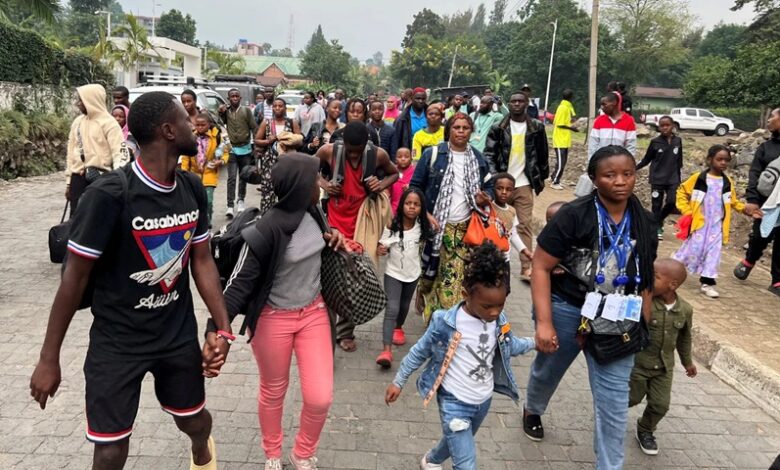‘I curse this war’: hunger and fear in Goma after rebel takeover
News Mania Desk / Piyal Chatterjee / 1st February 2025

People living in Goma on the Democratic Republic of the Congo’s eastern border with Rwanda have spoken of their fear and acute hunger after the M23 rebel group swept into the city earlier this week.
“We are very afraid. This situation feels hopeless,” said Judith Saima, a 28-year-old merchant in Goma, where heavy fighting that cut the city off from the outside world and left bodies piling up in the streets only subsided two days ago.
Access to food is a significant concern, after trade and agricultural supply routes were severed. “If this continues, we will all die, either from stray bullets or starvation,” said 26-year-old Ngise Ngeleka, a 26-year-old student living in the ULPG neighbourhood. Ngeleka said her neighbour had been hit by a bullet at the beginning of the week and that his body was still lying uncollected in the street.
Adeline Tuma, who lives in the city with her four children, said: “We have nothing left to eat. My children cry from hunger. I make porridge without sugar. My shop has been looted. I curse this war. A new, grim chapter of our lives begins.”
On Friday, the UN announced that at least 700 individuals had died and 2,800 were injured in Goma since Sunday, based on an evaluation carried out by the World Health Organization and the Congolese government. Boat travel, commonly utilized by many for transporting supplies, has practically been prohibited since M23 took control of Minova, a port town on Lake Kivu, last month. A different path through a minor border crossing connecting Goma to Gisenyi in Rwanda has similarly been closed.
On Sunday, residents were deprived of water and electricity. On Thursday and Friday, electricity and mobile data services were restored in certain areas, and the border with Rwanda, crucial for the city, was reopened, as M23 aimed to demonstrate its ability to maintain order and govern. The water service is anticipated to resume within the next few days. In the interim, certain residents have turned to filling jerrycans from Lake Kivu.
M23 is the most recent in a series of ethnic Tutsi-led rebel factions that have functioned in mineral-rich eastern DRC since a 2003 agreement intended to conclude conflicts that claimed 6 million lives, primarily due to hunger and illness. The group receives support from Rwanda, which states that its main goal is to eliminate militants associated with the 1994 genocide. Reports from the Congolese government and multiple UN sources indicate that Rwanda exploits the group to retrieve and subsequently export precious minerals utilized in items like mobile phones.
On Friday, the UN expressed worry over escalating violence in eastern Congo, following their previous day’s statement of “deep concern” about the rebels moving south from Goma toward Bukavu, the capital of the adjacent South Kivu province. The UN human rights office reported that it had recorded instances of summary executions and widespread sexual assaults in the past few days.
Hospitals have been inundated with individuals hurt in the conflict, and aid operations have been stalled. Internally displaced individuals have lacked assistance for several days, leading humanitarian organizations to make urgent appeals for an end to the violence. Street children have donned uniforms left behind by weary Congolese soldiers, with some having raided deserted stores.
Not all people in Goma oppose the arrival of the Tutsi-led group. A senior UN official told this week: “A lot of people are sick and tired of the chaos. If they can trade, security improves, their daily lives improve, then M23 could be popular.”
Olakire Senga said he thought the Congolese government had failed to protect its citizens. The doctor said: “I think we need to assess the maturity of those arriving and join them. Personally, I went out to welcome them.”
“Despite indications of a slowdown in Goma following days of fierce conflict, the demand for shelter, food, water, medical supplies, and safety in the city persists as urgent,” stated Rose Tchwenko, Mercy Corps country director for DRC. “We are currently in a time-sensitive competition to preserve lives.”
On Wednesday, M23 announced its plan to stay in the city, and the following day, Corneille Nangaa, leader of the Congo River Alliance, the political group supporting the M23, urged citizens “to return to their usual activities.” He also promised to ensure that children would be back in school within 48 hours and to establish a humanitarian corridor so those displaced by conflict could return home. What’s at risk is a possible reemergence of the conditions seen in the 1990s and 2000s, when Rwanda and Uganda, along with their proxy forces, took control of and administered the eastern borderlands of DRC, overseeing trade, communications, and transportation.






